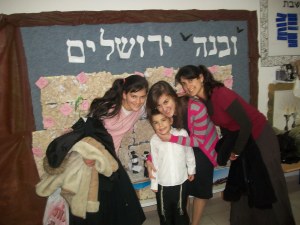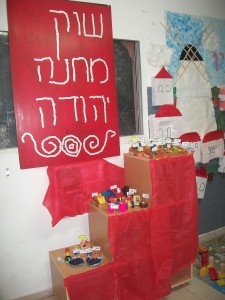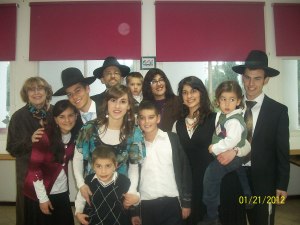On Tuesday night, I was ready to leave for a class on parenting, and said to my kids, “I’m leaving to my parenting class in a few minutes”. Dd17 looked up and said, “Oh, nice. Are you giving it in English or Hebrew?” She hadn’t heard that I’m obligated to attend these for the program that ds9 will be participating in at school!
>>I wonder what you think of the parenting classes? Are they totally different than the way you successfully run the home? Can you give one instead to fill your obligation?<<
I’ve only attended one class so far, so I can’t really judge. The teacher is very nice and everything she said was good. I didn’t feel the topic was especially compelling to me, since she was talking most of the time about report cards and how to help our children not feel their value was totally determined by grade. Personally, I don’t especially value report cards and my kids haven’t yet internalized the message that these are the end all and be all of who they are as people, so this isn’t much of an issue in our house. But I think the reminder to reflect back to our children their good qualities is a good one and this is what I took home with me. I really enjoy hearing lectures in Hebrew since I hear vocabulary that isn’t used in day to day conversations, so it helps me boost my language skills.
What I think defines how I approach parenting is two things: a) I’m very strongly a developmentalist versus a behaviorist, and try to understand where the root of an issue is coming from, rather than get distracted by the misbehavior. b) I have a very strong focus on the importance of emotional connection as a critical factor in development. I’ve read many, many parenting books over the years, but I’ve only seen these mirrored (and definitely expounded on) in what I’ve read/learned from Dr. Gordon Neufeld. This is why I loved it when I found his book six years ago – I kept telling my husband, ‘he’s saying what I’ve been saying!’ – and have invested in his parent training dvds just because I wanted to have an expanded understanding of the principles he talks about. He provided me with a deepened intellectual understanding of why what I was doing as a parent was effective, which took it from ‘this is what I do that works for me’ to ‘this is how anyone can be effective in different situations than mine’.
Afterward, the teacher told me she heard that I had ‘learned how to teach parenting’ and said she hoped that I wouldn’t be bored. I told her what I’ll say here – just because you already know something, doesn’t mean it’s not helpful to hear it again from a different perspective. If we did even a fraction of the things we knew we should do as parents, we’d all be amazing!
After the other parenting lecture I attended at the beginning of the week, a couple of mothers shared with me their discouragement about realizing how far they were from their ideals, and said they couldn’t imagine that was an issue for me. As if any of us has perfect control of ourselves all the time!! Of course I make mistakes (every single day!), I say things I shouldn’t, and more often, say the right things but in the wrong way. I’ve also had the same feelings sometimes, of falling short of where I want to be. We parents are so busy that it’s hard to constantly pause and respond to our children the way we should. So I appreciated that lecture as well, which talked about the importance of body language over the spoken content of what we say.
I was asked before leaving the US if I’d continue giving classes via telephone to women from my past classes, and said I’d seriously consider it. I really thought within 8 weeks that I’d restart my teaching. Then I got here, and I felt like I needed to put my emotional energy into being available for my kids, not talking about it! I didn’t want to be telling others what to do when we might be facing parenting issues we would have to struggle to figure out, and it’s critical to me that I share from a position of personal integrity. The lectures that are most meaningful and helpful to me are when I sense the teacher and their material are one, and that’s the person I want to be. I’m not inspired by great speaking skills or presentation, when I sense that someone can say the right things but isn’t really living it.
(That reminds me of a lecture I attended years ago. There was a large crowd of at least two hundred women, and afterward I went up to the very well-known speaker and chatted with her. I was implementing a strategy on a daily basis that she recommended during her talk, so I wanted to share with her what I was doing – and that’s when she told me she read about the idea but that she didn’t do any of it herself. Then she asked about where my kids were in school, and when I told her we homeschooled, she exclaimed, “I’d have gone crazy if I had to be around my kids all day How can you stand it?!” This isn’t an unfamiliar sentiment that I’ve heard expressed, but to hear it from someone who just inspired a large auditorium of women about personal development and advises many others on parenting made me feel that she was speaking about ideas that had only superficially impacted her as a person.)
I felt my kids might go through a difficult time and wanted them to have the privacy of their experiences without people expecting more of them because their mother is a parenting advisor. And for myself, I did something that I thought would give me more emotional space to have my own transitional experience, and that was, I purposely masked my strengths as a parent and educator so that I wouldn’t feel pressure to be a role model for anyone.
A couple of women who came with their families to our home for Shabbos meals commented on some things they saw in our home and asked about how we got those results, and I answered something vague like, “We’ve been lucky, they’re good kids.” When two local women asked me if I would give parenting classes (not knowing this is something I’ve done), I casually dismissed it and changed the topic.
All of this made sense to me at the time – I had so much emotionally to deal with when moving here, that I didn’t want to do it with me or my children under the spotlight of raised expectations. As it is, I’ve found that almost none of the teachers or principals have a real understanding of how difficult it is for immigrant children to make a huge lifestyle transition here that goes beyond just learning the language.
A couple of weeks ago, someone said she felt I would be a good person to facilitate the discussion group of a video shiur that will be starting next month. Someone else overheard and strongly added her agreement. A little light in my heart flared and I felt so happy inside at the idea of sharing in a wider forum again. These last couple of weeks, I’ve been reflecting on all of this and I wonder if I made a mistake. Or maybe it’s more accurate to say, maybe it’s time to reevaluate this approach. What I did made a lot of sense, and I do think it created the space for everyone to have their process. But at the same time, I cut myself off from something that is integral to my nature, that gives me inner light and happiness, while socially cutting myself off from being able to share an integral aspect of who I am with those I come into contact personally.
My realization this week is how deeply intrinsic to my emotional and spiritual makeup is the desire to empower and inspire others, to share meaningful and significant ideas that are of practical value. And though there is sometimes the pressure of the expections from others (and worse, myself!), and there is the work of organizing material for presentation, overall it’s something that fills me up rather than depletes me. I think that consciously avoiding letting anyone see this part of me, while it felt easier in the beginning, in the long run was in large part responsible for the feelings of discouragement and loneliness that I was feeling a couple of months ago.
It’s true that it was compounded by extreme tiredness of the first trimester, transitioning to life in a new country, the cold weather, making a bar mitzva far away from family and friends in a community we haven’t yet made many significant relationships in – but I wasn’t giving my inner sense of mission and purpose expression in my day to day interactions, or even in my own heart.
What does this mean practically? It really would take a lot of work for me to re-create all of my classes – I left behind all of my notes (part of the brutal decluttering process that got us here!), and when I did this, I relied on the fact I have recordings of my classes. But honestly, I don’t have lots of extra time to sit around and take notes on myself! So I’m not sure what I’ll do or when I’ll do it. Maybe I’ll sit with this until after Pesach (Passover) and the longer days of warmth and light return!
However, I believe that clarity about what really is important to you is critical, and having this realization about myself gave me a boost that made me feel like myself again. Now that my eyes are open and I’m being honest with myself about what I really love, I’ll be able to recognize opportunities for self-expression that I’ve been consciously closing the door on until now.
Avivah







